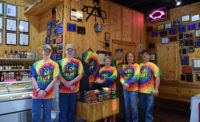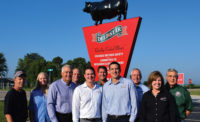Co-Packing: A winning partnership
A brand with a vision and a processor with the expertise can make for an excellent co-packing partnership.








The inspiration behind a best-selling brand can come from anywhere. It can be developed by meat industry professionals, or it can come from someone outside the industry who had a vision and the will to bring it to reality. When that happens, the most practical way to manufacture a product is for that new brand to find a capable co-packer to take the recipe and turn it into marketable products. When the relationship works, it can benefit both sides.
Mighty Spark Food is a brand new line of meat products, and everything about it screams “modern” and “current.” Their packaging has bold graphics and colors, the flavors are intriguing combinations and label claims are very much on-trend. It’s a meat line for the modern consumer.
Mighty Spark Food made its official launch on April 2. Product development for the brand began last fall, says Taylor Mulfinger, food scientist. He says that the product development involved some conventional and non-conventional methods to develop a list of items that hit the company’s core strengths but also expanded to other avenues. A Chicken Power Patty is half-chicken, half vegetables and other ingredients, for consumers who want to cut back on meat consumption without cutting it out entirely. The snack stick line includes interesting flavor combinations like a Honey Jalapeno Chicken stick and a Cranberry Ginger Chicken Stick.
“I’m not a huge kale person,” he admits, “but I’m into the blueberry and kale snack stick that I developed here with the team. If you look out across the [snack stick] category, there’s a lot out there. But ours are going to be low-calorie with lots of flavor. It’s essentially a healthy snack but something that you can enjoy at the same time.”
Founder and CEO Nick Beste says that the R&D team has developed more than 40 products for launch. The company is already in the market with a sister brand of products called Man Cave Craft Eats. This line, Beste explains, is designed to appeal to a broader customer base.
“We just thought that there was an opportunity in the market that is bigger than what Man Cave was going after,” he says. “We’re excited for Mighty Spark Food Co. because we think the opportunity is huge to appeal to a broad range of consumers that are looking for a modern, on-trend, premium brand in the meat department.
“If you look at every other department in the grocery store, you see this sort of modern, disruptive brand if you will, whether that’s Halo Top or RXBAR or Angie’s BOOMCHICKAPOP or even Krave Jerky. We want to be one of those brands in the fresh meat case,” he adds.
Mulfinger has worked in co-packing relationships previously, so he was able to take the company’s existing partnerships and add a couple as well. He says that he likes to work with established, knowledgeable companies that also have a creative side.
“I would say they have a vast knowledge of their processes, of their capabilities, of their people working for them, but they also have a sense of exploration and they have their own creative fire,” he explains. “We want somebody who definitely knows what they’re doing, of course, from a quality standpoint, from a food safety standpoint and all those things. But we also want somebody who’s interested in seeing what is on the next horizon and how they can grow as a company themselves.”
In the case of Mulay’s Sausage, the idea to enter the meat business started with a couple of self-described ski bums found themselves at a New York City street festival. After trying one of the sausages and finding it pretty poor quality, Lorree Weisman and her husband Ward decided on the way back to Crested Butte, Colo. to make a batch of Nana’s sausage for a Fourth of July festival.
“We borrowed a KitchenAid and ordered 100 pounds of pork and spices, and we linked up 400 sausages with the KitchenAid. It took us all day and a couple six-packs of beer,” she says, laughing. “The next day we took them to the fair and sold out within four hours.”
The Weismans were involved in sausage making for several years along with other enterprises before making Mulay’s Sausage their full-time career in 2013. The company offers a line of popular fresh varieties, from a Hot, Mild and Killer Hot Italian (all derived from Nana’s original recipe), German bratwurst and a chorizo. Distribution now extends to 40 states from the West Coast and expanding eastward, and Mulay’s recently introduced a line of pre-cooked sausages. Demand has, to say the least, far outstripped what a KitchenAid mixer can produce.
Mulay’s Sausage works with two co-packers now. Weisman says that one of the keys to a successful relationship is for the manufacturer to be willing to work with the brand’s specifications. Mulay’s sausages, for example, are made from antibiotic-free, humanely raised pork and are gluten-free as well. The company specifies all of its own pork suppliers, and the co-packers must be willing to work with them.
“One of our manufacturers did not do anything ABF prior to our arrival; now I think they do a lot more. The other one did a lot of ABF but didn’t work with our supplier. They have to be flexible enough,” Weisman says.
Trust is one of the most important parts of a co-packer relationship. The processor is entrusted with carrying out the recipe exactly as directed and being honest with costing. That trust must remain even if the working relationship may end.
“Everybody signs confidentiality agreements, but when you leave a processor for one reason or another – there are different reasons – you can trust that they don’t come out with a line of products just like yours,” Weisman says. “It’s something that we deal with.”
Looking for a reprint of this article?
From high-res PDFs to custom plaques, order your copy today!











